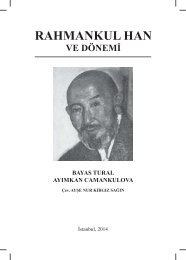THE SOVIET HISTORIOGRAPHY AND THE QUESTION OF KAZAKHSTAN’S HISTORY
SOVYET-TARIH-YAZICILIGI-ENG
SOVYET-TARIH-YAZICILIGI-ENG
Create successful ePaper yourself
Turn your PDF publications into a flip-book with our unique Google optimized e-Paper software.
<strong>THE</strong> <strong>QUESTION</strong> <strong>OF</strong> <strong>KAZAKHSTAN’S</strong> <strong>HISTORY</strong> 167<br />
15. Working Class – Thesis 1. 291<br />
It becomes clear that roughly 66 percent of all doctoral theses were<br />
based on Soviet influences, expectations, and ideology. 292 Another<br />
important provision for researches was to find and develop ideologically<br />
related topics and subjects in neighboring countries, such as Turkey<br />
and Iran, and conduct the research according to certain ideological<br />
constraints.<br />
4. Historians Reach to the Sources<br />
After having established the subject, the second important phase<br />
starts, which is to attain the sources and evaluate the archival documents.<br />
Because of the Soviet archives’ fidelity to the Soviet Union’s<br />
Council of Ministers, Soviet historians who wanted to use the archives<br />
had to apply for permission with a signed document from where the<br />
authority of their workplace (newspaper, magazine, university etc.)<br />
There had to be specific information about the subject they planned<br />
to examine, the purpose of the subject, and the expected result, in<br />
this signed document. Most of the time, even the research plan had<br />
to be included. Generally, the pivotal and local political party archives<br />
were only available to party members. The implementation about who<br />
can use which documents was predetermined. If the documents were<br />
not classified as confidential (sekretno) or very confidential (soverministrative<br />
government and state government of Republic of Ukraine after Soviet<br />
Union. Between 1994 and 1996, the private administrative affairs of President<br />
Leonid Kuçma was followed by historian doctor D.Tabachik and the humanitarian<br />
affairs vice supervisors of Prime Minister by academicians Ivan Kuras and<br />
Valeriy Smoliy. For more information see: Вaсильев, Вaлерий, “От Киевской<br />
Руси к Незaвисимой Укрaине: Новые концепции Укрaинской истории”,<br />
Нaционaльные истории в Советской и Пост советских госудaрствaх, Moscow1999.<br />
p. 215.<br />
291 To see the accepted doctorate thesis during this period look to: Bibliography of<br />
the Accepted Academic Thesises in Azerbaijan (years between 1920-1975), part<br />
1, Elm publication, Baku 1981, p. 114-187.<br />
292 During the years between 1920-1975, 40 doctorate thesis accepted simultaneously<br />
in Azerbaijan. 22 of these 40 thesis were directly about part during the soviet<br />
period, socialism, sacialist industry and likewise subjects. look.: Bibliography<br />
of the Accepted Academic Thesises in Azerbaijan (years between 1920-1975), p.<br />
164-187. See: Поспелов, П. Н., “Основные нaпрaвления нaучных исследовaний<br />
и подготовки нaучно-педaгогических кaдров по истоии КПСС” Все союзное<br />
совещaние о мерaхулучwения подготовки нaучно-педaгогических кaдров<br />
по историческим нaукaм, Москвa 18-21 декaбрья 1962 г., Moscow, 1964, p.<br />
15.



